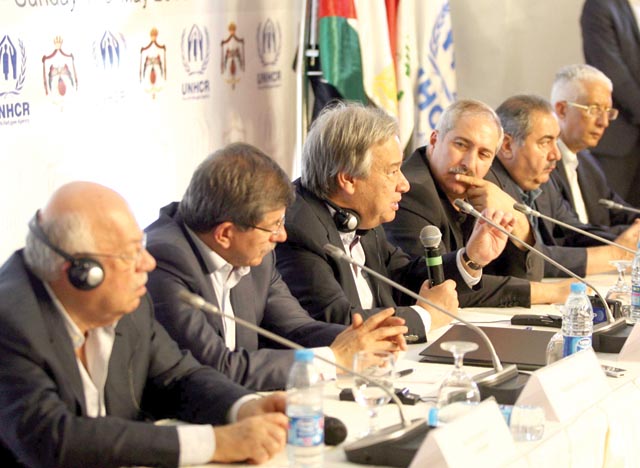ZAATARI — Neighbours of Syria on Sunday called on the international community to help hosts of Syrian refugees shoulder the humanitarian burden they are undertaking.
At a meeting hosted in Jordan, ministers representing the Kingdom, Lebanon, Turkey, Egypt and Iraq, along with the UNHCR, called on other countries to host Syrians and offer more flexible visa rules.
“It is clear [to] me that a crucial aspect in handling this crisis is to improve access [to] humanitarian aid inside Syria. It is also clear… that people should not be hindered while seeking asylum,” commented the UN High Commissioner for Refugees António Guterres.
At the third ministerial coordination meeting of major host countries for Syrian refugees, which took place at the Zaatari Refugee Camp, participants said that Syria has become the largest crisis of forcible displacement in the world, and is “posing a growing threat to a regional peace and security”.
The high-level meeting was co-chaired by Foreign Minister Nasser Judeh and Guterres, who were joined by Iraqi Foreign Minister Hoshyar Zebari, Lebanese Minister of Social Affairs Rashid Derbas, Turkish Foreign Minister Ahmet Davutoglu and Egyptian Deputy Foreign Minister Hamdi Loza.
At a press conference that followed a closed meeting, Judeh said the only solution for the Syrian crisis is a political one.
“We discussed the next practical way to deal with this continuous challenge… Our partnership with the UNHCR helped us share the burden, but the international community should also play a part in shouldering the load,” Judeh said.
The ministers also called for a full implementation of the Security Council Resolution 2139 to ensure the safe and unhindered delivery of humanitarian assistance to more than nine million people who need help in Syria.
“The full utilisation of the resolution has not been realised… there is a need for a full revision of the provisions to deal with the humanitarian crisis,” Judeh said.
This was echoed by the Turkish foreign minister, who noted that since the adoption of the resolution, only 78 trucks with aid were granted access to Syria by the Damascus regime.
He also noted that over the last three to four months, the attention of the world has been focused on other crises, like the one in Ukraine.
According to a statement distributed to the press after the meeting, the 2014 regional response plan appeal is only 25 per cent funded. Thus the ministers and the UNHCR commissioner urged donor countries to continue their support as the situation “worsens”.
The statement said the $1 billion of funding received so far has helped enable host countries, the UNHCR and its partners to provide life-saving assistance to millions of people.
The meeting also urged donors to fulfil pledges made at the second international humanitarian pledging conference for Syria, held in Kuwait in January this year, and to directly support governments and their different national resilience and development plans.
Addressing the press, Guterres said that until Saturday, the UNHCR had registered 2,739,000 Syrian refugees in neighbouring countries, “but if you include the unregistered Syrians who flee the country, we are now clearly above 3,000,000 Syrian refugees, not forgetting the 6.5 million Syrians displaced inside Syria”.
“It is important not to forget that this is the worst catastrophic humanitarian situation we are facing probably since the Rwanda genocide,” Guterres noted.
The UN official also stressed that attention should also be drawn to the structural problems that host countries are facing in education, health, water and electricity, caused by the huge inflow of refugees that have changed the demographics and economic situation of the countries.
“We also want to raise awareness that this is not merely a responsibility of the neighbouring countries.”
Jordan
At the beginning of the meeting, and during the press conference, Judeh briefed participants about the situation of the humanitarian crisis in Jordan.
He said Jordan is hosting 1.3 million Syrian refugees, 600,000 of them are officially registered, while the other 700,000 came before the crisis for economic reasons.
Zaatari, he noted, is the 4th or the 5th largest city in Jordan in terms of population.
“Every day for the past 22 months we have witnessed the camp growing and it is now hosting 125,000 refugees,” he said.
“Since the beginning of the crisis, the government has spared no efforts in hosting Syrians, sharing with them the little we have,” Judeh said, adding that the humanitarian crisis is “stretching the resources and society of Jordan in an unprecedented way”.
“We are here to remind the world of this crisis… the time has come for all of us to address this situation, to collectively identify challenges facing us.”
According to Judeh, there are 120,000 Syrian children enrolled in Jordan’s schools, while the occupancy rate at some state-run hospitals is 100 per cent.
Judeh also explained that 96 per cent of Jordan’s energy is imported, and because of the influx of Syrians, there has been a 9.5 per cent increase in household energy consumption.
He also tackled the pressures on the labour market as Syrians are competing with Jordanians for jobs, which inadvertently creates negative sentiments in host communities.
“When we talk about 3,358 new births in the Zaatari camp, this is a huge burden on us, and this is a continuing issue; thus we emphasise the need for a political solution to the crisis.”
Also on Sunday, Prime Minister Abdullah Ensour met with the foreign ministers and officials taking part in the meeting.
The premier underlined the burdens Jordan is enduring due to the Syria crisis and the ensuing pressure on the infrastructure and services.
The prime minister underlined Jordan’s stance in supporting endeavours to come up with a comprehensive political solution to the Syrian crisis, with the participation of all segments of society to help end the bloodshed and ensure the return of refugees.
Elissa Oddone contributed to this report.
